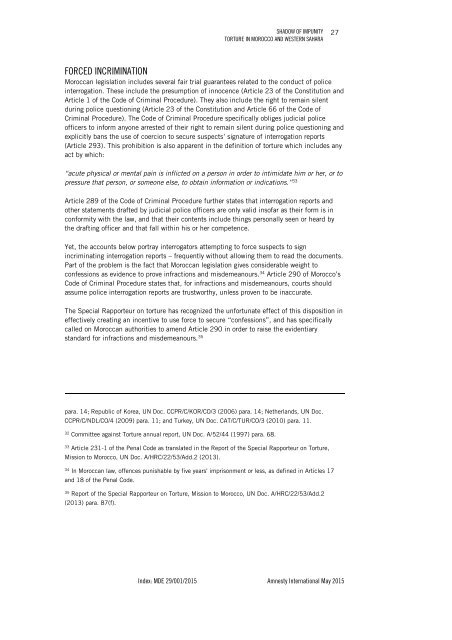7f2vH5qFw
7f2vH5qFw
7f2vH5qFw
Create successful ePaper yourself
Turn your PDF publications into a flip-book with our unique Google optimized e-Paper software.
SHADOW OF IMPUNITYTORTURE IN MOROCCO AND WESTERN SAHARA27FORCED INCRIMINATIONMoroccan legislation includes several fair trial guarantees related to the conduct of policeinterrogation. These include the presumption of innocence (Article 23 of the Constitution andArticle 1 of the Code of Criminal Procedure). They also include the right to remain silentduring police questioning (Article 23 of the Constitution and Article 66 of the Code ofCriminal Procedure). The Code of Criminal Procedure specifically obliges judicial policeofficers to inform anyone arrested of their right to remain silent during police questioning andexplicitly bans the use of coercion to secure suspects’ signature of interrogation reports(Article 293). This prohibition is also apparent in the definition of torture which includes anyact by which:“acute physical or mental pain is inflicted on a person in order to intimidate him or her, or topressure that person, or someone else, to obtain information or indications.” 33Article 289 of the Code of Criminal Procedure further states that interrogation reports andother statements drafted by judicial police officers are only valid insofar as their form is inconformity with the law, and that their contents include things personally seen or heard bythe drafting officer and that fall within his or her competence.Yet, the accounts below portray interrogators attempting to force suspects to signincriminating interrogation reports – frequently without allowing them to read the documents.Part of the problem is the fact that Moroccan legislation gives considerable weight toconfessions as evidence to prove infractions and misdemeanours. 34 Article 290 of Morocco’sCode of Criminal Procedure states that, for infractions and misdemeanours, courts shouldassume police interrogation reports are trustworthy, unless proven to be inaccurate.The Special Rapporteur on torture has recognized the unfortunate effect of this disposition ineffectively creating an incentive to use force to secure “confessions”, and has specificallycalled on Moroccan authorities to amend Article 290 in order to raise the evidentiarystandard for infractions and misdemeanours. 35para. 14; Republic of Korea, UN Doc. CCPR/C/KOR/CO/3 (2006) para. 14; Netherlands, UN Doc.CCPR/C/NDL/CO/4 (2009) para. 11; and Turkey, UN Doc. CAT/C/TUR/CO/3 (2010) para. 11.32Committee against Torture annual report, UN Doc. A/52/44 (1997) para. 68.33Article 231-1 of the Penal Code as translated in the Report of the Special Rapporteur on Torture,Mission to Morocco, UN Doc. A/HRC/22/53/Add.2 (2013).34In Moroccan law, offences punishable by five years' imprisonment or less, as defined in Articles 17and 18 of the Penal Code.35Report of the Special Rapporteur on Torture, Mission to Morocco, UN Doc. A/HRC/22/53/Add.2(2013) para. 87(f).Index: MDE 29/001/2015 Amnesty International May 2015


